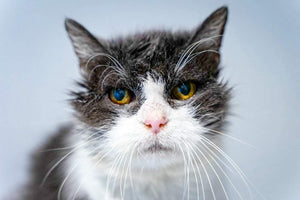Senior Cat Care Symptoms
Advances in medicine have increased the mortality rate of humans. You can say that the same goes for animals that just like humans need constant cat care when they reach their senior years. These symptoms vary so you have to be ready.
Cats reach their senior year or are classified as such when they have lived for 10 to 13 years. You might think that is nothing but one year for a cat is already 5 to 7 human years for them. So, if your cat is 10 years old, he or she is 70 years old?
Chances are, you have probably lost track of how long your cat has been there but a regular checkup with the local veterinarian can tell you if things are beginning to change.
Samples will then be taken from your cat and everyone will have to wait for the results. These consist of a blood sample, urinalysis and feces. It is here that the doctor can tell if your cat is anemic, has leukemia, is a diabetic, have kidney problems or has worms in the digestive system.
Aside from the physical, the vet will ask if you have noticed any changes in their activities or behavior. Some of the things often associated with old age that you should be aware of is the loss of sensory perception. This means their senses do not respond that fast anymore even if you try your best to play and train them to keep these sharp.
Another indicator is when your cat gets into a fight with another cat and there are injuries, the healing time may not be that fast anymore.
Studies show that one of the first things to wear out in a cat is the kidney as a result of hormone imbalance. If you notice that urine comes out while he sleeps or he urinates more frequently, then there is something wrong. The good news is that this can be treated if this was detected early.
Senior cats can no longer eat the same high quality diet as they used to in the past. They require specially formulated food that keeps their weight under control and helps reduce the consumption of nutrients that are risk factors in the development of diseases.
Exercise is another way to keep your cat in shape. This slows down the deterioration that takes place inside their body. Cats don’t play catch like dogs so give them a ball of yarn or some other toy to play with.
If your cat is in pain and something has to be removed, you have no choice but to let it undergo surgery. You should check with the vet if they will be given anesthesia before hand so they don’t feel anything during the operation.
Other symptoms you have to be aware of once you cat reaches senior age includes a significant increase or decrease in appetite, diarrhea, vomiting, lameness lasting for more than 5 days in one leg, a decrease in vision, excessive panting, a seizure, blood in the stool or urine, hair loss, persistent coughing or gagging and breathing heavily or rapidly at rest.
The second any of the above symptoms occur, you should bring your cat straight to the vet because just like humans who have reached the golden years, senior cats need more attention especially when any of the symptoms are present.
CAT HEALTH > Senior Cat Care Symptoms

